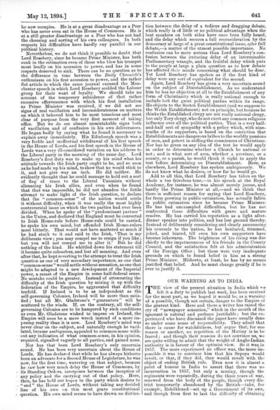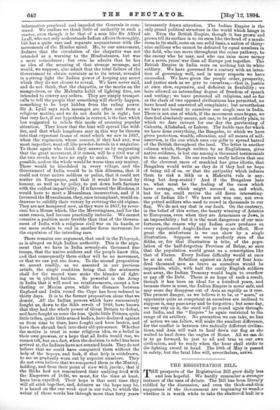OUR WARNING AS TO INDIA. T HE view of the present
situation in India which ye felt it a duty to publish last week, has been received for the most part, as we hoped it would be, as a warning of a possible, though not certain, danger to the Empire of the gravest kind. Here and there a writer has raised the cry of "newspaper sensation," which in the mouth of the ignorant is natural and perhaps justifiable ; but the ex- perienced who have discussed the paper have usually done so under some sense of responsibility. They admit that there is cause for watchfulness, but argue that, for one reason or another, no repetition of the Mutiny is to be feared ; and though their reasons do not convince us, we are quite willing to admit that the weight of Anglo-Indian authority is in favour of the optimist view. So it was, in 1857. The more experienced an officer was, the more im- possible it was to convince him that his Sepoys would revolt, or that, if they did, they would revolt with the object of ending British rule. Even now it is almost a point of honour in India to assert that there was no insurrection in 1857, but only a mutiny, though the regiments were repeatedly, during the three years of war, renewed from the body of the people, though every dis- trict temporarily . abandoned by the British—take, for example, Rohilkhund—set up a Government of its own, and though from first to last the difficulty of obtaining information perplexed and impeded the Generals in com- mand. We confess we think little of authority in such a matter, even though it be that of a man like Sir Alfred Lyall, who not only understands Indian affairs thoroughly, but has a quite rare and separate acquaintance with the movements of the Hindoo mind. He, to our amazement, declares that the circulation of the chapattis was not intended as a warning to the Hindostanees, but was a mere coincidence ; but even he admits that he has no idea of the meaning of that strange message, and -would, we suppose, also admit that the total failure of the Government to obtain certainty as to its intent, revealed in a strong light the Indian power of keeping any secret which they do not choose to reveal. We have never said, and do not think, that the chapattis, or the marks on the mango-trees, or the Mahratta habit of lighting fires, are intended to convey any orders. They are simply trumpet- calls to tell the people that something will shortly happen, something to be kept hidden from the ruling power. Sir A. Lyall says such messages are often sent from a religious motive, and we do not doubt he is right ; but that very fact, if our hypothesis is correct, is the fact which has suggested to rebels this mode of arousing popular attention. They know that the hint will spread like wild- fire, and that whole kingdoms may in this way be thrown into that expectant frame of mind which we saw in 1857, when the regiments, whose concert, if they had any, was most imperfect, went off like powder-barrels in a magazine. To those again who think they answer us by suggesting that the great movement, if it comes, will be a civil war of the two creeds, we have no reply to make. That is quite possible, and on the whole would be worse than any mutiny. There would be bloodshed in every village, and the Government of India would be in this dilemma, that it could not trust native soldiers or police, that it could not scatter its Europeans, and that it would be bound by honour, as well as by policy, to put down both factions with the coldest impartiality. If it favoured the Hindoos, it would have to meet a Mussulman insurrection, and if it favoured the Mussulmans, they, once triumphant, would en- deavour to solidify their victory by reviving the old regime. They are not hampered now, as they were in 1857, by rever- ence for a House which, like the Merovingians, and for the same reason, had become practically imbecile. We cannot conceive a position more terrible than that of the Govern- ment of India with a religious civil war on its hands, or one more certain to end in another fierce movement for the expulsion of the intruding race.
There remains one argument, that used in the Telegraph, as is alleged on high Indian authority. This is the argu- ment that we have in India seventy-six thousand fine troops, that the native soldiers and the people know this, and that consequently there either will be no movement, or that we can put one down. To the second proposition we assent readily, as we assented in our previous article, the single condition being that the mutineers shall for the second time make the blunder of fight- ing us in pitched battles. So powerful is the Army in India that it will need no reinforcements, except a few Grading or Maxim guns, while the distance between England and India round the Cape has been reduced to thirty days. It is to the former proposition alone that we demur. All the Indian powers which have successively fought us, down to the Sikh revolt of 1848, have known that they had the whole power of Great Britain to defeat, and have fought us none the less. Quite little Princes, quite little tribes, quite little armed bodies, have declared against us from time to time, have fought and been beaten, and have then shrunk hack into their old quiescence. Whether the motive is trust in some religious idea, or a belief in their own prowess, or a hope that all India would rise, we cannot tell, but as a fact, when the decision to rebel has been arrived at, the Indians have not counted heads. They do not believe that we could have conquered them without the help of the Sepoys, and look, if that help is withdrawn, to see us gradually worn out by superior numbers. They do not even believe that we conquered them in the Mutiny, holding, and from their point of view with justice, that if the Sikhs had not remembered their undying feud with the Emperors of Delhi, we must, for the time at least, have been expelled. Their hope is that next time they will all stick together, and, delusive as the hope may be, it is based on the one weak spot in our rule, to which the writer of these words has through more than forty years incessantly drawn attention. The Indian Empire is the only grand political structure in the world which hangs in air. Even the British Empire, though it has grown and grown till its surface is to its stem like the head of a mush- room to its stalk, rests on one solid basis, a nation of thirty- nine millions who cannot be defeated by equal numbers in the field, who can move throughout the ocean pathway, be the enemy who he may, and who can raise more money for a seven years' war than all Europe put together. The British Empire in India rests on nothing but its white soldiery. We have governed for a century with an inten- tion of governing well, and in many respects we have succeeded. We have given the people order, prosperity, and justice such as we give to ourselves,—that is, justice at once slow, expensive, and deficient in flexibility ; we have allowed an astounding degree of freedom ef speech and writing ; we have protected all religions, and so far as the clash of two opposed civilisations has permitted, we have heard and answered all complaints; but nevertheless we have not bound to ourselves one single race in India. There is not one of which, if the movement once began, we dare feel absolutely secure, not one, to be perfectly plain, to which we dare entrust for one day the garrisoning of Calcutta, Allahabad, or Lahore. The feeble race for which we have done everything, the Bengalee, to which we have given protection, wealth, education, and all means of self- assertion, is the one which uses our gifts to spread hatred of the British throughout the land. The letter in another column which, though written by an Englishman, gives native evidence, is but one among a thousand testimonials to the same fact. Do our readers really believe that one of the cleverest races of mankind has gone idiotic, that Bengalees would write as they do if they had no hope of being rid of us, or that the antipathy which induces them to risk a Sikh or a Mahratta rule is any- thing but deep-seated ? And if the Bengalees hate us, what must be the feeling of the races which have courage, which might succeed us, and which, but for us, could revive the old fierce interesting- ness of Indian life ? We have not won one, not even the petted soldiers who used to crowd in thousands to our flag. We do not say that is our fault. On the contrary, in the belief of this writer, the hearty winning of Asiatics to Europeans, even when they are Armenians or Jews, is an impossibility ; but it is the most dangerous of our mis- fortunes, the reason why any Indian scare produces on every experienced Anglo-Indian so deep an effect. How great the misfortune is we can show by a single illustration. Suppose we were perfectly sure of the Sikhs, or, for that illustration is trite, of the popu- lation of the half-forgotten Province of Behar, so sure that the population would grant us a conscription like that of France. Every Indian difficulty would at once be at an end. Rebellion against an Army of four hun- dred thousand men as brave as ourselves would be impossible, while, with half the costly English soldiers sent away, the Indian Treasury would begin to overflow or pay off the Debt. There is no hope of such a result, though it has been an ideal for a hundred years, and because there is none, the Indian Empire is never sale, and may some day disappear out of Asia as rapidly as it rose. The present danger, as we believe it to be, or "scare," as opponents quite as competent as ourselves are inclined to suppose it, may pass away and be forgotten ; but some day, we may rely on it, the word will go round again through- out India, and the "Empire" be again restricted to the range of its artillery. No precaution we can take, no line of action we can follow, will make the smallest difference, for the conflict is between two radically different civilisa- tions, and Asia will wait to haul down our flag as she waited to haul down the eagles of Rome. All we can do is to go forward, be just to all and true to our own civilisation, and be ready when the hour shall strike to die fighting sword in hand. The 10th of May is passed in safety, but the fatal Ides will, nevertheless, arrive.



































 Previous page
Previous page